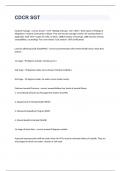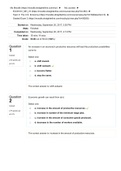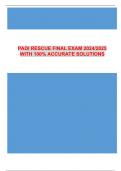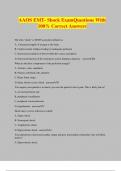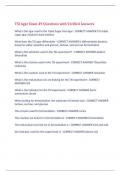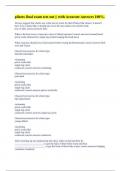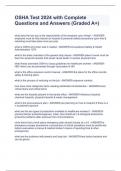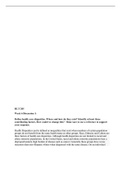Multiple Choice practice Test – Ancient History of Philosophy – Fabienne Lehmann
1. Aristotle, upon his return to Athens in 335 BC, opened a school for Athenians called:
a. Lyceum
b. Academy
c. Peripatos
d. Entelechy
1. Aristotle’s most famous pupil was
a. Plato
b. Socrates
c. Alexander the Great
d. Himself
1. Which of these would be an efficient cause for a model airplane?
a. the toothpicks
b. the directions
c. the person putting it together
d. the plastic wings
1. According to Aristotle, actions that are pursued for themselves are:
a. Better than actions that aren’t
b. Lacking diversity
c. Worse than actions that are
d. Hierarchical lower than others
1. Which life is the most preferable according to Aristotle?
a. Political
b. Contemplative
c. Ordinary
d. Economical
1. In Aristotle’s view common people are:
a. Slaves to their own pleasures
b. Independent of external factors
c. Dependent on other people
d. On the easiest way to reach eudaimonia
1. Aristotle states that if we ask what the highest good of human action is:
a. there is no agreement about the answer.
b. nearly everyone agrees that it is happiness.
c. there is no objective answer to this
d. most people agree that it is pleasure.
, 1. According to Aristotle, knowledge is:
a. The second potentiality
b. The first actuality
c. Pure potentiality
d. a. And b. are correct
1. Something that is non-substantial and universal can be:
a. Said of something but not in something
b. Said of something and be in something
c. Not said of something and not be in something
d. Not said of something but be in something
1. Homonymy describes the situation in which:
a. Two terms of one category describe the same object
b. One term describes two objects of the same category
c. A term has the same meaning as another term
d. One term describes two objects of different categories
1. The primary substance according to Aristotle is:
a. The individual
b. The genus
c. The category
d. The natural being
1. How does the theory of Aristotle’s soul differ from Plato’s?
a. Plato’s is separated into two parts: reason and emotion
b. Aristotle believes in the immortality of the soul, Plato does not
c. Plato’s soul is split into three parts, whereas Aristotle’s soul is one
d. Aristotle’s soul is organized into four parts, Plato’s only into three
1. Plato lived during
a. 5th and 4th century BC
b. 4th and 3rd century BC
c. 3rd and 2nd century BC
d. 4th and 5th century AD
2. The basic character of Soldiers, according to Plato, is
a. Wisdom
b. Appetite
c. Courage
d. None of the above
3. The most prominent characteristic of Plato’s State is
a. There is specialization of functions
b. There is no specialization of functions
c. There is decentralization of functions
d. There is no decentralization of functions
4. According to Plato, knowledge is
a. Recollection
b. Learning
c. Self-study
d. Trusting our senses
1. Aristotle, upon his return to Athens in 335 BC, opened a school for Athenians called:
a. Lyceum
b. Academy
c. Peripatos
d. Entelechy
1. Aristotle’s most famous pupil was
a. Plato
b. Socrates
c. Alexander the Great
d. Himself
1. Which of these would be an efficient cause for a model airplane?
a. the toothpicks
b. the directions
c. the person putting it together
d. the plastic wings
1. According to Aristotle, actions that are pursued for themselves are:
a. Better than actions that aren’t
b. Lacking diversity
c. Worse than actions that are
d. Hierarchical lower than others
1. Which life is the most preferable according to Aristotle?
a. Political
b. Contemplative
c. Ordinary
d. Economical
1. In Aristotle’s view common people are:
a. Slaves to their own pleasures
b. Independent of external factors
c. Dependent on other people
d. On the easiest way to reach eudaimonia
1. Aristotle states that if we ask what the highest good of human action is:
a. there is no agreement about the answer.
b. nearly everyone agrees that it is happiness.
c. there is no objective answer to this
d. most people agree that it is pleasure.
, 1. According to Aristotle, knowledge is:
a. The second potentiality
b. The first actuality
c. Pure potentiality
d. a. And b. are correct
1. Something that is non-substantial and universal can be:
a. Said of something but not in something
b. Said of something and be in something
c. Not said of something and not be in something
d. Not said of something but be in something
1. Homonymy describes the situation in which:
a. Two terms of one category describe the same object
b. One term describes two objects of the same category
c. A term has the same meaning as another term
d. One term describes two objects of different categories
1. The primary substance according to Aristotle is:
a. The individual
b. The genus
c. The category
d. The natural being
1. How does the theory of Aristotle’s soul differ from Plato’s?
a. Plato’s is separated into two parts: reason and emotion
b. Aristotle believes in the immortality of the soul, Plato does not
c. Plato’s soul is split into three parts, whereas Aristotle’s soul is one
d. Aristotle’s soul is organized into four parts, Plato’s only into three
1. Plato lived during
a. 5th and 4th century BC
b. 4th and 3rd century BC
c. 3rd and 2nd century BC
d. 4th and 5th century AD
2. The basic character of Soldiers, according to Plato, is
a. Wisdom
b. Appetite
c. Courage
d. None of the above
3. The most prominent characteristic of Plato’s State is
a. There is specialization of functions
b. There is no specialization of functions
c. There is decentralization of functions
d. There is no decentralization of functions
4. According to Plato, knowledge is
a. Recollection
b. Learning
c. Self-study
d. Trusting our senses

